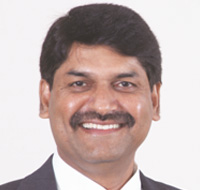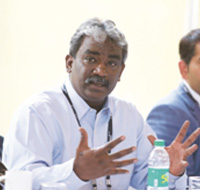Incentivizing digitization and digital transactions
As the entire country strives to go cashless in the aftermath of the historic demonetization, the government’s firm backing is necessary. With this idea, it is expected that the finance minister’s announcements will have a major focus on catalyzing digital transactions through incentivizing mobile wallets and online banking. Bhavin Turakhia, Co-founder and CEO at Directi believes, “2016 saw a slew of announcements made by the government. With the goal of putting our country on the path towards a cashless economy, the Union Budget 2017-18 should include definitive SOPs and tax rebates to encourage and boost e-payments.”
 “With the goal of putting India on the path to a cashless economy, the Budget should include definitive SOPs and tax rebates to encourage and boost e-payments.”
“With the goal of putting India on the path to a cashless economy, the Budget should include definitive SOPs and tax rebates to encourage and boost e-payments.”
Bhavin Turakhia
Co-founder and CEO
Directi
Abhimanyu Bhosale, Co – Founder, CEO at Livehealth a startup in the healthcare domain supports this idea and points out that online transactions, will check the economic slowdown. He says, “The interesting thing to look forward for this budget would be how the government promotes and incentivizes electronic payments to minimize economic slowdown as much as possible.”
 “Budget now needs to focus growth and providing adequate support to various pillars of each program so that the economy is on a sustained growth path.”
“Budget now needs to focus growth and providing adequate support to various pillars of each program so that the economy is on a sustained growth path.”
Anil Valluri
President
NetApp India & SAARC
Rajeev Jain, CFO of Intex Technologies believes that the cashless economy is more a reality than ever before. He believes, “India is moving towards a digital economy and mobile banking. Smartphones will play a crucial role in supporting this vision. The recent demonetization reform by the Government has further laid the ground for setting a cashless economy.” Directi’s Bhavin further adds, “With the increase in cash flow within banks, advanced technological infrastructure will help facilitate seamless transactions and improve the overall banking system as we enter into the new financial year.”
Innovation, Startups and Make in India
The different initiatives that have been promoted by the government in its tenure, the year 2017 is crucial with regard to maturity of the Digital India vision. Fostering innovation in the country, enabling and promoting startups across spheres and spurring indigenous manufacturing through Make in India are the most crucial elements for this. As HDS’ Vivekanand Venugopal points out, “As we advance towards an economy under the Digital India initiative, we are optimistic the upcoming budget will create opportunities keeping innovation in the heart of every policy. To efficiently drive the journey of Digital India, the focus should be to modernize infrastructure as this will boost growth across sectors, especially technology.”
 “Supportive financial systems and uncomplicated process in getting clearances along with provision of tax are some key expectations for the startup ecosystem.”
“Supportive financial systems and uncomplicated process in getting clearances along with provision of tax are some key expectations for the startup ecosystem.”
Abhimanyu Bhosale
Co-founder, CEO
Livehealth
Startups across the country are looking for added benefits and support to leverage them further ease of business. This is further supported by Directi’s Bhavin who says, “Steps should also be taken to help startups tide over its immediate effects. A startup hub, India is currently home to the third largest number of technology driven startups in the world. The previous year witnessed multiple markdowns in the country’s startup ecosystem and, therefore, to propel this forward, the PM’s flagship ‘Startup India’ project should receive an impetus in the upcoming budget.”
 “We are expecting relaxation of the rule of ‘not more than 25%’ of the business coming from one vendor for online marketplaces.”
“We are expecting relaxation of the rule of ‘not more than 25%’ of the business coming from one vendor for online marketplaces.”
Vinamra Pandiya
Founder and CEO
Qtrove.com
Vinamra Pandiya, CEO of Qtrove.com opines, “As an e commerce start up, we look forward to receiving some more clarity for FDI in B2C e-commerce through an automatic route. Besides this, we are also expecting relaxation of the rule of ‘not more than 25%’ of the business coming from one vendor for online marketplaces.” Livehealth’s Abhimanyu adds to Vinamra’s comments, “Supportive financial systems and an uncomplicated process in getting clearances along with the provision of tax are some of the key expectations for the startup ecosystem to thrive and boom in the country. We are hopeful that the union budget 2017 will be positive for the entire startup ecosystem.”
 “Govt. should bring in investment-friendly policies, increase ease-of-business, improve long-term tax incentives, along with timely deal closures and project clearances”
“Govt. should bring in investment-friendly policies, increase ease-of-business, improve long-term tax incentives, along with timely deal closures and project clearances”
Vivekanand Venugopal
Vice President & General Manager
Hitachi Data Systems
The government has also being crying out loud to enterprises to manufacture in India, thus keeping the major part of the wealth inside the country. The budget should also dwell on streamlining policies and launching new initiatives supporting the Make in India vision. HP India’s Rajiv Srivastava comments, “While the relaxation of FDI and introduction of several initiatives have helped citizens embrace economic transformation and digitization, additional initiatives to boost domestic manufacturing will also help them adopt technology in its most tangible form. On the business front, IT manufacturers are bracing themselves for the implementation of the much anticipated Goods and Services Tax (GST).”
Rajeev Jain, CFO, Intex Technologies explains, “As an industry, we expect a long-term and stable policy on mobile manufacturing in India. The industry has huge potential and can supplement government initiatives of ‘Make in India’ with highly technical products. Incentives to create sufficient technical manpower will lay the foundation of a strong and robust manufacturing base in India. A clearly laid out research and development policy is necessary to succeed in a highly technical industry and will help bring component manufacturing base in India to save precious foreign exchange.”
Enabling employment through skill development
As the country goes digital, the onus of having a skilled workforce to operate the IT infrastructure comes on the government. Catering a massive population is not an easy job. With digitization automating a number of processes, a number of orthodox jobs will become extinct, or will use relatively less number of people. However, implementing and operating a digital network would need professionals qualified for specific tasks with specific skills needed. The industry expects budget to highlight this aspect with clear, programs, initiatives and incentives. Bhavin Turakhia, Co-Founder and CEO, Directi says, “To adapt to the need of time, government should also rationalize income tax provisions including provisions related to employee tax benefits such that payments/ documents in the digital medium are treated at par with physical instruments.
 “Considering recent initiatives by the Govt. in the areas of job creation, skill development and education, we hope this budget to be beneficial for companies like us.”
“Considering recent initiatives by the Govt. in the areas of job creation, skill development and education, we hope this budget to be beneficial for companies like us.”
Major Manjit Rajain
Group Chairman
Tenon Facility Management and Security


